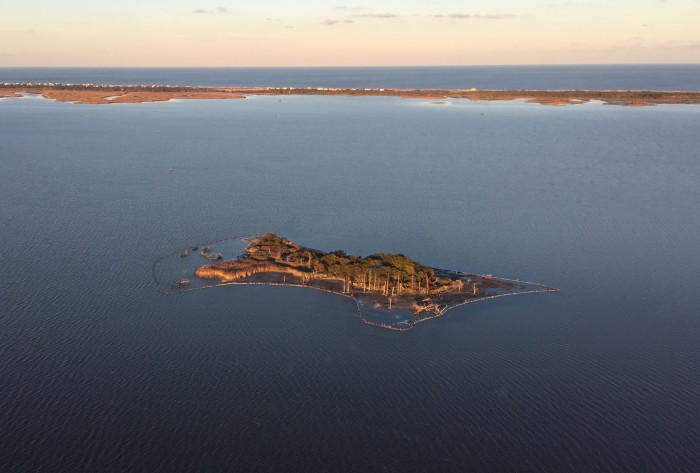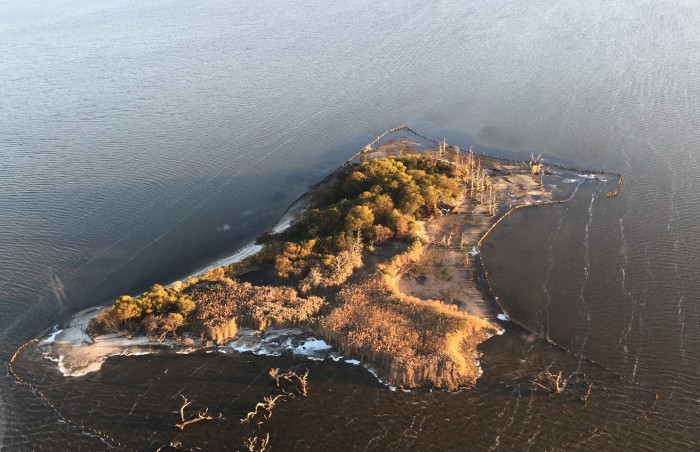The view from the top of the Currituck Beach Lighthouse is extraordinary. To the east the Atlantic Ocean crashes into Corolla beach in channels of white-crested waves; to the south on the clearest days, the water tower in Duck, 13 miles south, is barely visible. Looking west, the Currituck Sound is dotted with islands near the shoreline, and then open water until it reaches the mainland.
Looking north and slightly to the west, there is an island that sits alone in the sound, and someone with binoculars, or particularly acute eyesight, may notice the structures that dot the island.

This is Monkey Island, named for the Pamunkey Indians, who used it as a hunting camp before European settlers came to the new world. The island is a jewel that sits in the middle of Currituck Sound and houses the remnants of a clubhouse, manager’s quarters and outbuildings that have given way to decay over time.
There was a time when the seasons on the Outer Banks were reversed and summer was the slow time of the year, a time when farmers tended their fields. As they brought in harvests, and the first migrating ducks and geese arrived. And, accompanying the arrival of these migratory waterfowl, the Outer Banks hunt clubs filled with the rich and elite of Philadelphia, Baltimore, New York City and Washington, D.C. areas.
At one time there were more than 100 hunt clubs from Back Bay, at the northern tip of Currituck Sound, to Hatteras Island. Few remain because property taxes on the land put many out of business, members found the price of membership too high, and sons and daughters did not have the continuing interest in hunting.
When the Monkey Island Club closed its doors in 1974, a chapter in the history of the Outer Banks closed with it. At one time this club sitting atop a seven acre island rivaled all the hunt clubs of Currituck Sound as a place of wealth and privilege.
Monkey Island was never as ornate or opulent as the Whalehead Club or many of the other clubs surrounding it, yet its membership represented some of the most wealthy and powerful figures of its day.
It first became a private hunting club in 1869 when Norfolk investors purchased the island for $15. It then changed hands a number of times until a group of tobacco executives bought the property in 1919, and they incorporated the island and surrounding land as the Monkey Island Hunting Club.
These weren’t just any tobacco executives, though. They included George Hill, president of the American Tobacco Company, and his executive vice president, Charles Penn, who’s largely credited with developing the Luck Strike brand of cigarettes.
Through the 1920s and 1930s some of the most renowned writers and columnists of the day were guests at the Club. Roland Clark, one of the best known outdoor artists of the day, was a regular guest. According to legend he hunted with a sketch pad and pen in hand.
The hunting and fishing remained good through the 1960s, but in 1974 heirs of the founders decided to sell the island along with two miles of beachfront property they owned. A series of failed businesses followed and eventually the U.S. Fish & Wildlife came into possession of Monkey Island.

USFW granted the island to Currituck County in 1988 with the understanding that the county would restore the grounds and create a nature center. When the county did not accomplish this, the ownership reverted to back to the USFW.
Today Monkey Island is administered as part of Mackey Island National Wildlife Refuge, and access to the island is forbidden without permission. The island itself is an important rookery for great blue and little blue herons, great egrets and other wading birds.
There are boat and kayak trips that circle Monkey Island, but without permission from the USFW landing on the island is not permitted.
